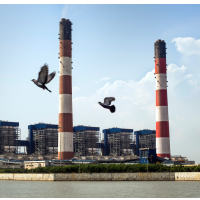Gujarati Villagers Sue World Bank Arm in US Court
 Tata Mundra power plant (photo: Sami Siva)
Tata Mundra power plant (photo: Sami Siva)
For the first time ever, a local community affected by a World Bank project has filed a lawsuit in a United States court. Fishermen and farmers in Gujarat are suing the International Finance Corporation (IFC), the private lending arm of the World Bank, for providing a loan for the Tata Mundra coal-fired power plant.
It’s not clear, however, why the litigants have not first sued the project itself in an Indian court. The lawsuit was filed on Thursday in a US federal court in Washington, D.C.
The litigants allege that the IFC, by providing the loan, caused a negative impact on their health, property and livelihoods. The suit accuses IFC of “irresponsible and negligent conduct” in handling its $450 million financing package for the coal plant.
Lawyers for EarthRights International, an environmental group with offices in the U.S., South America and Asia, filed the suit on behalf of people living and working near the coal plant, which is located on the coastline of the Gulf of Kutch.
They claim that the power plant has “fundamentally altered the local environment.” Heated water pumped from the plant has allegedly reduced fish catches, and coal dust and fly ash has allegedly contaminated farms and homes.
The suit, which seeks class-action status, seeks compensation for harm to local residents’ livelihoods and a court order enforcing IFC’s standards for protecting people and the environment.
The IFC has not commented directly on the lawsuit’s claims. A company spokesperson said in a statement that the IFC and the plant's operators have been working to address local community concerns.
“IFC has played a critical role in the Tata Mundra project, both in terms of investing and in providing guidance on environment and social practices,” it said in an earlier statement.
By developing guidelines to reduce harm to neighbours, and helping Tata implement them, “IFC ensured that the project’s environmental and social impacts are in line with good international industry practices.”
In the World Bank Group, the World Bank lends to governments, while the IFC lends to corporations such as the Tata group that built and operates the Mundra plant.
The lawsuit claims that the IFC’s handling of the project represents a “mission failure” because the plant’s construction and operations have “done substantial harm to local people and the environment.”
The suit charges that the IFC knew that the plant would have serious social and environmental consequences but proceeded “without taking reasonable steps to prevent the harms it specifically foresaw.”
According to the International Consortium of Investigative Journalists, international organizations such as the World Bank Group generally claim a high level of legal immunity, which makes it difficult to sue them.
EarthRights’ lawyers reportedly believe that the circumstances of the case and recent legal decisions would defeat any claims of immunity.
However, the litigants will certainly be asked why they are pursuing the lender and not the project operator. The fishing and farming communities affected could have sued the Tata group in a court in India. Why then have they chosen to sue the IFC instead in a US court?
EarthRights may therefore find itself under pressure to prove that this lawsuit is not an attempt to create a media splash in the West by targeting the World Bank Group instead of a more practical suit against an Indian company in an Indian court.
- Karan Singh
To Learn More:
Lawsuit accuses World Bank arm of “mission failure” (by Michael Hudson and Barry Yeoman, International Consortium of Investigative Journalists)
Indian Communities Suffering from Destructive Coal Plant Sue the IFC in U.S. Courts (Centre for International Environmental Law)
World Bank projects displaced 380,000 in India (Business Standard)
- Top Stories
- Controversies
- Where is the Money Going?
- India and the World
- Appointments and Resignations
- Unusual News
- Latest News
- India College Chain’s Expansion into U.S. Draws Opposition from Massachusetts Officials over Quality of Education
- Milk Shortages in India Tied to Release of New Movies Featuring Nation’s Favorite Stars
- Confusion Swirls around Kashmir Newspaper Ban in Wake of Violent Street Protests
- Polio-Free for 5 Years, India Launches Vaccine Drive after Polio Strain Discovery
- New Aviation Policy Could Increase Service, Lower Ticket Prices






Comments